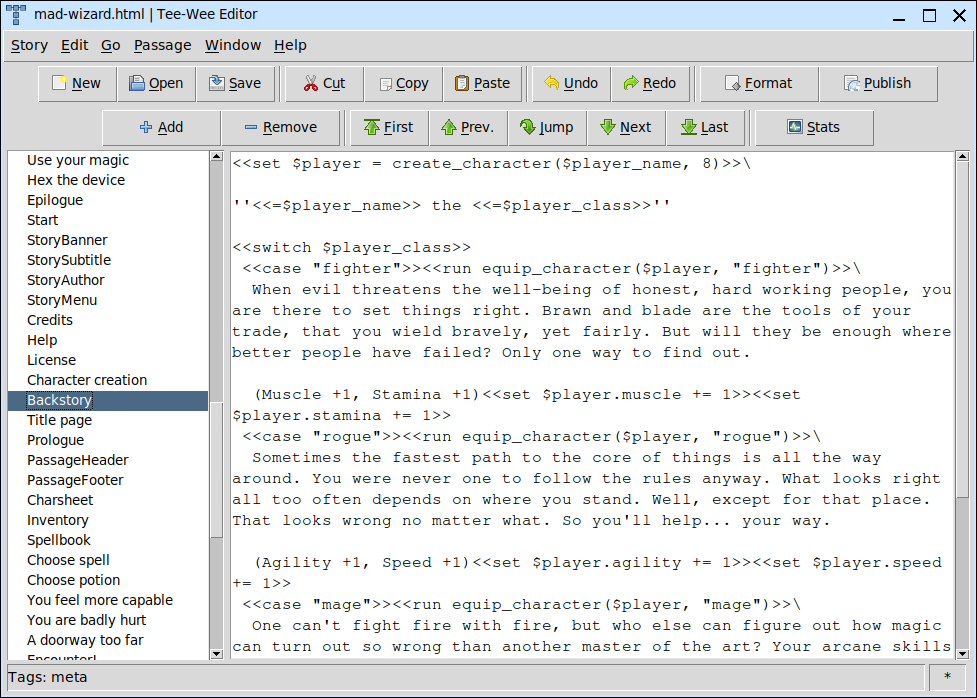Hello, everyone! The big news this week is of course Tee-Wee Editor reaching version 1.0:

To discuss an obvious change: the user interface now sports a second toolbar; I tweaked the widget layout to account for it. Makes the user interface kind of busy, which is reason enough to refrain from adding much more. Beware, young programmer: people always ask for features they don't really need. But any new feature is a burden not just on you, but them as well. Makes it that much harder to spot the stuff you actually need and then click on it. That's why people are desperate for simple software in an era when even command-line tools suffer from way too much complexity.
Three times now Tee-Wee has been praised for being much more accessible than its older cousin. Which in turn is much simpler than some of the competition.
Weren't these authoring tools supposed to let anyone make games?
In the way of news, this edition we have an interview with Jon Ingold and a retrospective of The 7th Guest, in addition to my own detailed release announcement from Itch. Details under the cut.
Over on Itch.io, I marked the 1.0 release of Tee-Wee Editor with a few words:
When I released the first alpha of Tee-Wee Editor last Saturday, I didn't expect to follow up with version 1.0 in less than a week. Let alone to see it gain a first user (and a first story made with it) within the same week.
Tee-Wee Editor can be traced back to many experiments over the years, and many things I wrote about interactive fiction. Its time had to come however; before this winter, I wouldn't have thought to make a tool like this designed specifically as part of an ecosystem.
Good thing I did, because a surprising number of people seem to need this kind of alternative.
Tee-Wee Editor is very simple; that's a feature. It's also rough around the edges, having just landed. That people can and are using it already goes to show how little we need... and also how much we need it.
It's a good feeling, seeing your work validated like that. Thank you all. Can't wait to see what this leads to, in the way of new works and more.
But first to see what people have to say about my little toy. Got much else to do in the mean time, anyway.
This week, Jon Ingold of Inkle fame talks to Escapist Magazine about their upcoming game Pendragon, which despite the title turns out to be about contemporary politics, a theme that pervades the entire interview. Yes, games would better bring up current affairs, preferably on purpose instead of tacilty defending the status quo. Fiction has a way to call out problems even before journalism. And yes, it can also do the very important work of bringing hope, not in the sense of waiting for a miracle but more like "we can get through this together, and here's how". That and reminding people of forgotten truths. (Because there is such a thing as truth, and don't let anyone say otherwise.)
I also like what Jon Ingold has to say about sifting through the various versions of Arthurian legend and making his own blend. Because stories need to be retold if they are to remain meaningful as the world changes. And we need them to.
To help each other through these trying times, we need guiding lines... and guiding lights. So value the people who can provide them for the rest of us.
On Friday, The Digital Antiquarian gives us the story of The 7th Guest. It's a story typical of the early 1990s for the most part: one of overambition and overwork ending with a flash in a pan (albeit one that's still remembered to this day). It's also pervaded by the theme of conflict between narrative and gameplay, that people still haven't really come to terms with. But pay attention to this part:
None of the press or public seemed to even notice that it was far from obvious what the player was supposed to do amidst all the graphical splendor, beyond the vague notion of “exploring.” The Trilobyte trio flew back to Oregon thoroughly gratified, surer than ever that all of their instincts had been right.
What do you know. Even back then, a lot of games really wanted to be walking simulators and couldn't. What were developers supposed to offer players, a place to explore? A past to uncover? No, no, see, they're called games. You're supposed to play at something. Hence all the adventures with horrid puzzles that add absolutely nothing and take much away.
Strange attitude from people who, like The 7th Guest's co-creator, really wanted to make interactive movies. Maybe don't blame early tech for "not being there yet".
Enjoy the Sunday, and see you!